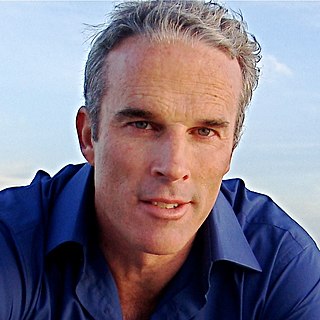A Quote by Mark Powell
Much of the attention on oceans has portrayed oceans as a villain. Warm water strengthened Hurricane Katrina that pounded Louisiana. Rising sea level will flood islands and coastal areas. Or, we're talking about new opportunities like a new shipping lane in the Arctic because of melting sea ice. These may be the obvious problems, but they're probably not the biggest ones.
Related Quotes
Saving Greenland is both a metaphor and a precondition for saving civilization. If its ice sheet melts, sea levels will rise 23 feet. Hundreds of coastal cities will be abandoned. The rice growing river deltas of Asia will be under water. There will be hundreds of millions of rising-sea refuges. The word that comes to mind is chaos. If we cannot mobilize to save the Greenland ice sheet; we probably cannot save civilization as we know it.
Rising sea levels will result in tens to hundreds of millions more people flooded each year with a warming of 3 or 4°C. There will be serious risks and increasing pressures for coastal protection in South East Asia (Bangladesh and Vietnam), small islands in the Caribbean and the Pacific, and large coastal cities, such as Tokyo, Shanghai, Hong Kong, Mumbai, Calcutta, Karachi, Buenos Aires, St. Petersburg, New York, Miami and London.
But in a way you can say that after leaving the sea, after all those millions of years of living inside of the sea, we took the ocean with us. When a woman makes a baby, she gives it water, inside her body, to grow in. That water inside her body is almost exactly the same as the water of the sea. It is salty, by just the same amount. She makes a little ocean, in her body. And not only this. Our blood and our sweating, they are both salty, almost exactly like the water from the sea is salty. We carry oceans inside of us, in our blood and our sweat. And we are crying the oceans, in our tears.
The oceans are in trouble. There are some serious problems out there that I believe are not clear to many people. My hope is to continually find new ways of creating images and stories that both celebrate the sea yet also highlight environmental problems. Photography can be a powerful instrument for change.
Oceans need more attention because climate change IS an ocean issue. Our oceans will be the first victim, and sea life will suffer dramatically. Detailed proof is hard in ocean science, but I think we're already seeing big ocean changes caused by climate change, such as starvation of whales, seabirds, and other animals off the coast US west coast.
Depending on how quickly you get ocean rise, you have people who live in river deltas [at risk]. Bangladesh is largely a river delta, and the rising sea level means that when storms come in, the human sanitation is backing up, the ability to farm, it's destructive-type situations like you saw in New Orleans with Katrina. You're increasing the frequency of that stuff in low-lying areas fairly dramatically.
We've lost half the summer sea ice in the Arctic. We've wiped out an enormous percentage of the world's coral reefs. We see huge changes in the planet's hydrology already, the cycles of drought and flood both amped up because warm air holds more water vapor than cold. These things are happening with a one-degree increase and going to two degrees won't be twice as bad, the increase in damage won't be linear, it most certainly will be exponential. So it was precisely the wrong moment to elect Trump.


































